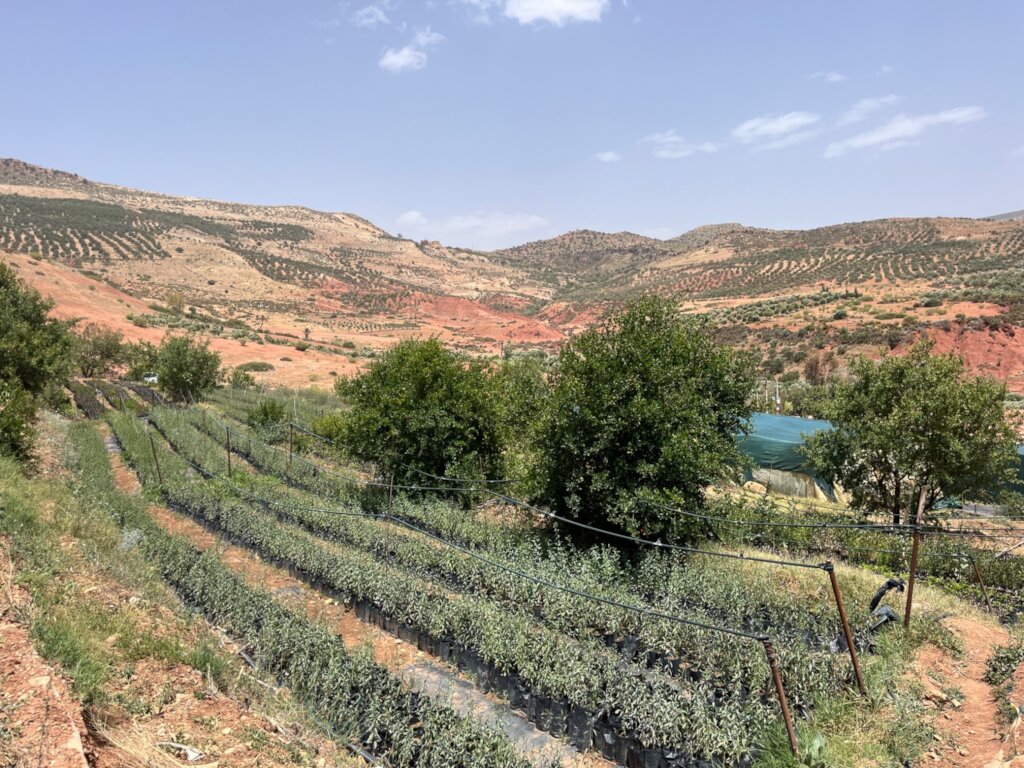By Naima Sawaya | HAF Intern, University of Virginia Student
Both of my grandmothers were excellent gardeners. They grew tomatoes (a notoriously temperamental plant), figs, basil, mint, and a plethora of other plants meant to attract and nurture beautiful creatures such as butterflies and hummingbirds. They, perhaps more than anyone else I know, had green thumbs.
In the United States, many accept as a fact of gardening life that those with the secret power of the “green thumb” are the ones whose gardens and farms will thrive.
These people have a knack for supporting plants. And for those who do not have this green thumb — me — we simply lament the lack of this gardening prerequisite before giving up on plants entirely.
But no matter how large a role this term “green thumb” plays in colloquial conversations, it is not a scientific phenomenon. So what, then, does it mean to have a green thumb?
I do not know if Mohammed, the caretaker of the High Atlas Foundation’s tree nursery in Azilal, has ever heard the term “green thumb” or if there is even something comparable in Moroccan colloquial Arabic.
But he, in wholly embracing his role as a nursery caretaker, has thought deeply about what it means to give to the land and to expect it to give something back to the community. For him, it seems, a green thumb is not an intrinsic trait but rather a love for plant-based work that can and should be cultivated.
The Azilal tree nursery began in 2014 as the second tree nursery project that HAF undertook. It now houses approximately 250,000 saplings, almost half of which are olive trees. The rest include a mix of almond, pomegranate, grapes, and fig trees.
These trees are supported by a well, a solar-powered water pump, a basin, and intricate networks of drip irrigation. Additionally, there are multiple, extremely humid greenhouses, containing mostly olive trees.
In all the ways one would expect of a well-established tree nursery with exceptional biodiversity and deep ties to the community, the Azilal tree nursery seems to be thriving.
The only problem that Mohammed identified was the pesky greenhouses — they were shaped more like squares than half-circles, a form which could pose a problem if rain fell.
Located on the hillside of the High Atlas mountains, this is not an easy place to raise baby trees. The land had to be terraced before the idea of trees was even possible.
Water, while not as scarce here as elsewhere in Morocco, is a precious resource. And there are no seasonal pauses in work.
The fact that the greenhouses were the only problem and that everything else at this nursery — most importantly, the trees themselves — was in tip-top shape speaks to the sort of caretaker Mohammed is.
According to Amina Al Hajjami, he is “perfect” because he is creative in solving the problems of his nursery, quick to learn from both mistakes and successes, and deeply intelligent.
I do not say this to tell a tale of one man who triumphs over all the environmental and financial challenges in his way — that would be an enormous cliché and worse untruthful to the reality of the Azilal tree nursery. For one thing, the challenges have never entirely disappeared but are rather ever-present.
But more importantly than that banal yet hard reality, is the fact that this tree nursery is, above all, a labor of love. Specifically, a community labor of love.
Caretaker Mohammed has had unique success in the size of what he, with the help and support of many others, has achieved. In the United States, we would say that he has a “green thumb.”
But for him, the diagnosis of whatever success he has achieved is much simpler — if you do not give to the land and to the trees from the bottom of your heart, the seeds will not grow. Plants can only ever succeed when they are the product of “hard work with love.”
In his own words, he is driven not necessarily by the physical result of what his labor produces so much as the value he knows he is giving the community.
For him, the immense challenge of autumn when there is such hustle and bustle is manageable when put into perspective — each tree helps a farmer become more self-sufficient and returns biodiverse nutrients to the soil.
So perhaps, people who “have” green thumbs are not endowed with a special plant-related gift. Rather, they are people,like Caretaker Mohammed, who have the passion to give to the land with their full hearts and the strength to expect it to give back.
By Mohamed El Khabbaz | Tree monitoring officer
By Nizar Bellamqaddam | HAF Tree Monitoring Officer
Project reports on GlobalGiving are posted directly to globalgiving.org by Project Leaders as they are completed, generally every 3-4 months. To protect the integrity of these documents, GlobalGiving does not alter them; therefore you may find some language or formatting issues.
If you donate to this project or have donated to this project, you can receive an email when this project posts a report. You can also subscribe for reports without donating.
Support this important cause by creating a personalized fundraising page.
Start a Fundraiser